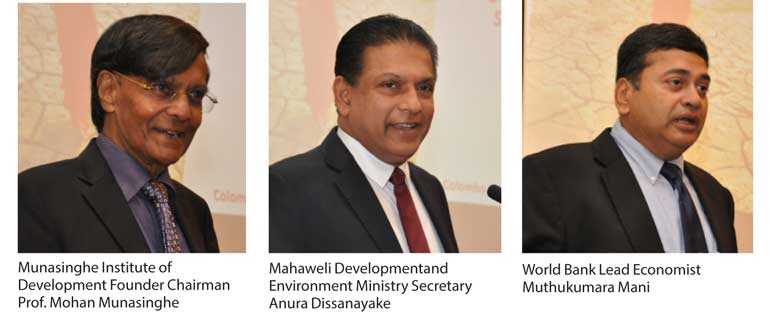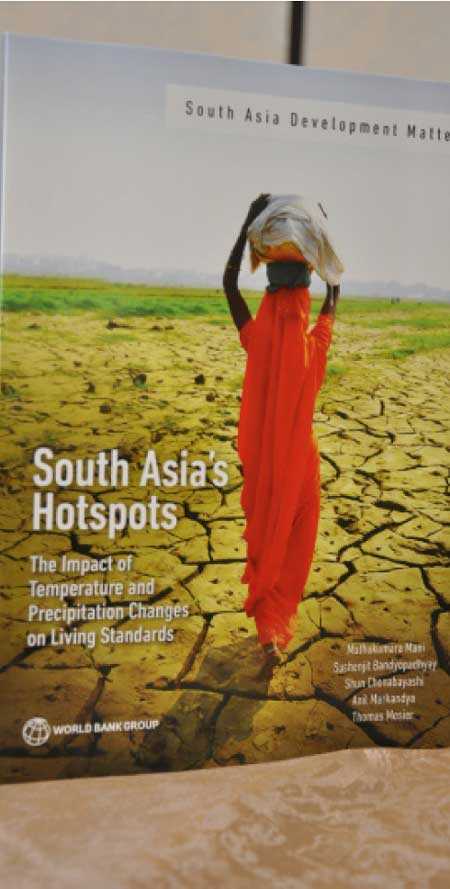Wednesday Feb 18, 2026
Wednesday Feb 18, 2026
Friday, 21 September 2018 00:00 - - {{hitsCtrl.values.hits}}


 By Charumini de Silva
By Charumini de Silva
Top experts yesterday warned that climate change could severely impact the living standards of Sri Lankans, while calling for quick uptake to avoid a loss of 7.7% GDP, or $ 50 billion, by 2050.
Unveiling the World Bank Regional Flagship Report ‘South Asia’s Hotspots: The Impact of Temperature and Precipitation Changes on Living Standards’ in Colombo yesterday, the experts insisted on quick action to be related to an advocacy which will enable informed decision-making.
The World Bank Lead Economist and author of the report Muthukumara Mani cautioned that, worst case scenario, living standards of Sri Lanka could decline by 7.7%, a loss of $ 50 billion.
He said the severe hotspots in Sri Lanka where the impact would be felt most are around agricultural areas in the dry zone, which include Northern Province, North Western Province and North Central Province.
“In the severe hotspots, the living standards could fall up to 11% in a worst case scenario, wiping out $ 12 billion from GDP,” he added.
Mani also said that as non-agricultural jobs would grow resilient to climate change, agricultural families may have opportunities to grab in those sectors, while access to markets and increased education would help as well.
According to him, areas that will be most impacted by changes in temperature and precipitation would see living standards fall by 4-8% by 2050.
“If you’re a construction worker, you would find it hard to work when the temperature increases,” he said.
Mani pointed out that investment in education, health, market access and non-agricultural jobs is required to improve climate resilience in Sri Lanka.
The report flags that almost half of South Asia’s population now lives in vulnerable areas, described as ‘hotspots’, which could see their living standards decline as a result of falling crop yields, lower labour productivity or related health impacts.
“Weather changes will result in lower per capital consumption levels that could further increase poverty and inequality across South Asia,” he added.
Mani stressed that the cost of inaction is highest in severe. “Many hotspots are already in socially and economically vulnerable areas.”
Delivering the keynote address, Munasinghe Institute of Development Founder Chairman Professor Mohan Munasinghe said that leaders and innovators can push governments to identify issues, change values and implement solutions.
“We basically knows what’s to be done, but it’s just that it hasn’t happened. Sustainable Development Goals 2030 is the last chance the world has to combat climate change,” he added.
Noting that business is part of the solution, not part of the problem, he said he looks forward to a society with consumers and producers practicing sustainability working together and spreading sustainable behaviour throughout society.
“The triple bottom line is the way forward, and using resources efficiently is a very good win-win scenario to use as a starting point,” Prof. Munasinghe stressed.
In terms of the Sustainable Sri Lanka Vision and Strategic Path, he said the country hopes to have a thriving economy, green environment and inclusive society by 2030.
He dismissed confusions by explaining that the Sustainable Sri Lanka Vision and Strategic Path is not a political manifesto or a detailed national plan duplicating work of other Ministries, but a strategy which uses existing national and sectoral plans and policy documents where ministries and others can build practical solutions.
“We look at three snapshots in 2020, 2025 and 2030. We now have a nations sustainability discourse ongoing to build the nation’s consensus for policy continuity and implementation,” he stated.
Prof. Munasinghe said that in Sri Lanka, they are looking to integrate the climate policy into the mainstream sectors.
The World Bank Program Leader Andrew Goodland said they have delivered $ 20.5 billion in climate-related financing in 2017, which accounts for 32% of the World Bank’s total lending.
“Now all our projects must undergo a climate risk screening to ensure adaptive actions are mainstreamed in the operation,” he added.
In Sri Lanka, he said the World Bank is working closely with the Government to support climate resilience and adaptation to climate change.
“Under the Climate Resilience Improvement Project, we are supporting major investments to improve flood protection and resilience to landslides,” he stated.
Acknowledging that the proposed Climate Smart Irrigated Agriculture Project is scheduled for approval this year, Goodland extended his support to improving water management for agriculture, including rehabilitation of irrigation systems in identified hotspots in the country.
Mahaweli Development and Environment Ministry Secretary Anura Dissanayake said they were in the process of developing a project proposal on integrated water resources management to be funded by the World Bank and the Green Climate Fund.
“This project will undertake the conservation of water sheds in the central hills, which would result in increasing the quantity of water in our network of reservoirs. We will also address the issue of drinking water, particularly in the dry zone where many people have become victims of CKDu,” he asserted.
It has also been proposed to transfer excess water from the rivers flowing down to the wet zone to the dry zone areas, which would help reduce flash floods in the wet zone and to increase water availability in the dry zone. The water so transferred will be stored in the cascade system of reservoirs of different sizes.
He said that agroforestry promotion is also in the works, which would provide opportunities to cultivate selected crops mainly for the export market. He believes these interventions would ultimately bring about increase of family income levels of farmer communities.
Highlighting that Sri Lanka is at high risk from a variety of climate-related factors, which has significantly caused major economic and social problems that are driving the Government’s interest to build resilience to climate risks, he insisted that they welcome the World Bank’s report to understand how increasing temperatures and changing rainfall patterns interact with social and economic structures at a fine granular level across the region, including Sri Lanka. Pix by Lasantha Kumara